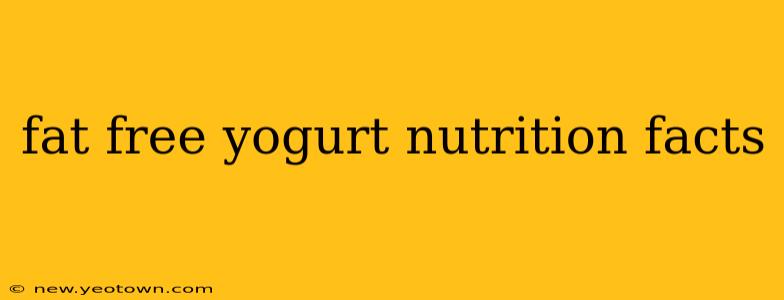Yogurt, that creamy, cool comfort food, has become a staple in many healthy diets. But with so many options on the shelves – whole milk, low-fat, fat-free – it can be hard to know which one best fits your nutritional needs. Today, we’re focusing on fat-free yogurt, exploring its nutritional profile and answering some common questions.
Our journey begins with a tale of two yogurts: one brimming with fat, the other lean and mean. Imagine two identical containers of yogurt, both equally creamy and tangy. The difference? One boasts the richness of whole milk fat, while the other has had its fat meticulously removed, resulting in our star player: fat-free yogurt. This removal process significantly alters the nutritional landscape.
What are the Nutritional Benefits of Fat-Free Yogurt?
Fat-free yogurt shines in several key nutritional areas. It's generally lower in calories than its full-fat counterparts, making it a great choice for those watching their weight. A typical serving provides a decent amount of protein, crucial for building and repairing tissues, keeping you feeling full and satisfied. It’s also a good source of calcium, vital for strong bones and teeth, and often fortified with Vitamin D, another essential nutrient for bone health. Many brands also boost their fat-free yogurts with probiotics, beneficial bacteria that support gut health and overall well-being.
But the story doesn't end there. Let's delve into some frequently asked questions to paint a more complete picture.
How Many Calories are in Fat-Free Yogurt?
This is highly variable depending on the brand, serving size, and added ingredients like fruit or sweeteners. However, a typical single-serving container (around 6 ounces) of plain, unsweetened fat-free yogurt generally contains between 80-120 calories. Adding fruit or sweeteners will increase the calorie count. Always check the nutrition label on your specific product for accurate calorie information.
Is Fat-Free Yogurt Good for Weight Loss?
Fat-free yogurt can be a helpful tool in a weight-loss plan because of its lower calorie count compared to full-fat varieties. The protein content contributes to satiety, helping you feel fuller for longer and potentially reducing overall calorie intake. However, it's important to remember that weight loss depends on a balanced diet and regular exercise. Don't rely solely on fat-free yogurt for weight loss; it's just one piece of a larger, healthier puzzle.
Does Fat-Free Yogurt Have Protein?
Yes! Fat-free yogurt is a good source of protein. The protein content varies slightly between brands, but generally, a single serving provides around 10-15 grams of protein. This protein is vital for numerous bodily functions, from muscle building to immune system support.
What are the Downsides of Fat-Free Yogurt?
While fat-free yogurt offers numerous benefits, it's not without its potential drawbacks. The removal of fat can sometimes lead to a slightly thinner consistency compared to whole-milk yogurt. Also, fat provides essential fatty acids, some of which our bodies can’t produce on their own. While fat-free yogurt lacks these fats, a balanced diet rich in other sources of healthy fats (like avocados, nuts, and olive oil) will usually compensate. Finally, some individuals find that fat-free yogurts can be slightly more tart or less creamy than their full-fat counterparts.
Conclusion: Finding Your Perfect Yogurt
The decision of whether or not to choose fat-free yogurt depends entirely on your individual dietary needs and preferences. If you're watching your calorie intake or prefer a lower-fat option, fat-free yogurt is a great choice. But it's essential to remember to look at the full nutritional profile, including added sugars, and to consider incorporating other healthy foods into your diet to ensure you are meeting your nutritional needs. So, the next time you're browsing the yogurt aisle, remember this tale of two yogurts and choose the one that best fits your story.

